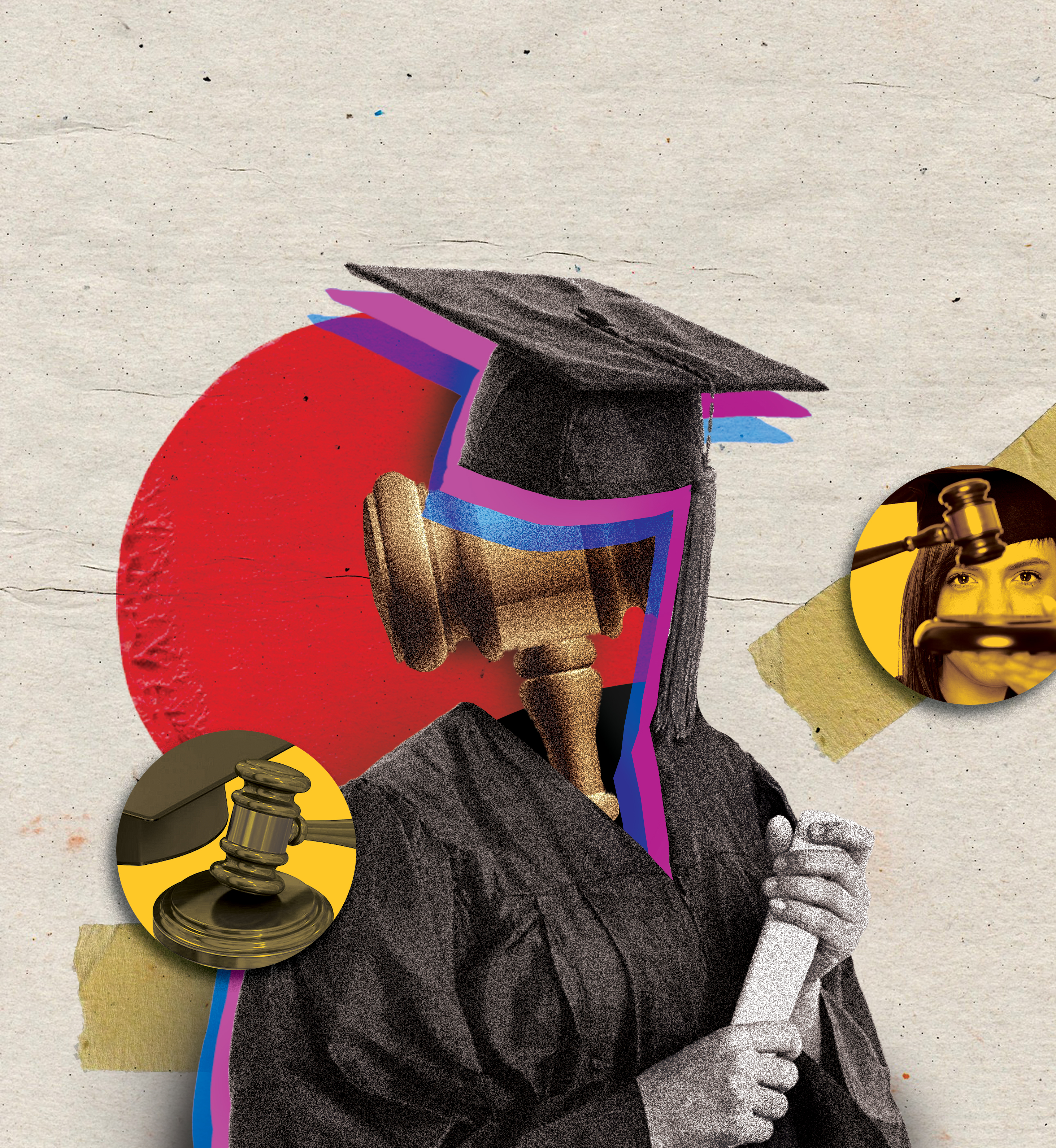What fresh Law graduates can expect when entering the legal profession

Working as a lawyer in Bangladesh, being an advocate advancing arguments in hallowed courtrooms – the inception of these aspirations emerges from a sense of intrigue. There are those of us who crave the thrill of the legal battle, the inspired aesthetic portrayed in television. There are those of us who are blessed and burdened with ideals, a desire to sculpt statues of justice in an unjust world. There are also those of us who dream of material comfort. However, between such lofty dreams and the reality of being a fresh Law graduate, there exists a stark, sobering contrast.
"In the past, some used to say that the path to becoming an advocate after graduation was easy, but this no longer holds true. As of now, that path is most certainly an arduous one," says Md Asaduzzaman, the Attorney General of Bangladesh.
The Attorney General explained further by laying out the landscape of the Bar Council exam, which all graduates must face if they wish to practice in court: "Over 41,000 people appeared for the MCQ portion of this year's examinations; only about 13,000 passed. About half of these candidates are likely to be successful in the written portion. The viva after that will whittle their numbers down even further. Thus, from the original 41,000, only about three to four thousand are expected to become advocates. The remaining will inevitably have to try again the following year."
The struggle, however, only begins with enrolment, according to Md Asaduzzaman. He says, "Even after enrolment, there is no guarantee that they will find a senior to work under as law firms are few in number by comparison. And even if they do find a senior, there is no guarantee that they are going to be paid. As a result, for about five years following graduation, they will have to carry on with a survival mindset."
This seemingly boundless chasm that separates graduates from their advocacy aspirations is something they have to confront daily. But the post-graduation period also provides an unparalleled opportunity to learn.
"I was lucky to be under the direct supervision of very supportive seniors," says Zaied Al Sabah, who is currently pursuing the LLM/PGDip (Bar Training Course) at the University of the West of England, Bristol, following a year of full-time employment as a Junior Associate at Lincoln's Chambers.
He continues, "In particular, I'm grateful to the head of the chamber, Barrister Md Riaz Uddin, who personally instructed me in crucial legal matters, and accompanying him to court gave me valuable exposure to the world of legal practice."
Regarding the skills he had to develop, Zaied goes on to say, "First, I worked on improving my communication skills, both in interacting with clients and in coordinating with seniors. I focused on enhancing my drafting abilities, given that preparing legal documents is an important part of the profession. I learned to analyse and understand complex legal issues more effectively, which has strengthened my overall legal reasoning and practical knowledge."
But Sanaul Islam Tipu, an Advocate of the Supreme Court of Bangladesh, though immensely grateful to his own seniors for their support and guidance, admits that seniors who play an active role in helping their juniors make up only a fringe minority.
Thus, in the vast majority of situations, young graduates must be their own teachers. He reflects, "In this profession, you must have the drive to know more. Cases are like cinema. From start to finish, you must immerse yourself in every detail. A lawyer needs to learn everything, small or big, and those who are negligent in that learning do not have it in them to be lawyers."
But the price of learning is always a tireless and grueling process.
Barrister Nafia Haque, who is currently a lecturer at London College of Legal Studies (LCLS) (South), and an adjunct lecturer at the University of Liberal Arts Bangladesh (ULAB), shares her personal experience from the time she worked as an apprentice lawyer, "I had to be at court by 9 - 10 AM, which meant that I had to set out much earlier from my home. And after finishing there, I had to go directly to the chamber I worked at in Gulshan. The work felt overwhelming at first, and there was a lot to take in, especially since none of this was ever taught to us in LLB. On a good day, I could finish work and reach home by 9 - 9:30 PM. But on bad days, I'd have to stay back till much later, 12 AM even."
On the matter of remuneration, Nafia somberly cautions, "Compared to how much you will have to work, be it as someone new, or even as an experienced associate, you will never be paid enough."
Advocate Sanaul shares his personal experience on the matter, "When I started as an apprentice lawyer in 2012, my senior used to pay me 50, 100, or maybe 200 taka per day. But some days, it was just the bus fare – 30 taka. But beginnings have always been like that. My senior used to tell me that his senior paid him with meals of bananas and bread at the very start."
While things have improved since then, the financial struggle remains. Apprentice lawyers who come from less privileged backgrounds inevitably find themselves walking on a dire social tightrope.

Advocate Sanaul continues, "Those of us who were from middle-class families, having completed our bachelor's and master's degrees, were naturally expected to find stable employment and earn a good living. So, our families, relatives, and neighbours must have wondered why we, despite being educated, were unable to earn much money. This is a feature of our profession: income always starts late."
On making ends meet, Fahim AL Mustafiz, Barrister-at-Law of Lincoln's Inn and Advocate, District and Sessions Judge Court, Dhaka, offers his advice, "It is wise for young lawyers to take up part-time work to generate some income. The most viable part-time work, in my opinion, is teaching law, or any other subject. However, one must not be vested in that part-time work so much that it significantly affects their engagement at the chambers."
However, Natasha*, a lawyer who has become disillusioned with legal practice, feels that the chamber culture is inherently exploitive and that many law chambers are actively hindering the growth of aspiring lawyers. She shares her insight, saying, "They will try to exploit you when you are a new graduate. They know that they won't need to pay you much, that you are hungry and will be happy with whatever you get. Small chambers will try to influence you to stay, curbing your career progress."
Natasha* continues, "The work environment in law chambers is a bit toxic by default. You get commissions based on your work, and there will always be people getting paid more than you and those getting less. There is always a lot of competition."
Md Asaduzzaman believes that senior lawyers have a role to play in making the profession more bearable for its newest entrants and that they should adopt a more positive attitude towards their juniors.
But the struggles of a young lawyer don't limit themselves to merely the realms of work and pay.
On the personal struggles that lawyers may have to face because of their profession, the Attorney General elaborates, "Society, and even your own clients, will tend to view you in a negative light. Landlords will hesitate to have you as tenants. And fathers will think ten times before considering you for marriage with their children."
Thus far, it should be clear beyond doubt that a life in pursuit of legal practice is a difficult life indeed. And those who do so must carry in their hearts hope and a sense of purpose that cannot be extinguished easily.
"The fact that my work contributes to changing lives, in helping innocent people get bailed, is an immense honour for me," says Muntaha Tarik, an Apprentice Lawyer at the District and Session Judge Court, Chittagong.
Tahsin Hasan Ameer, a Junior Associate at Zakaria and Associates, despite the hardships of a legal career, also expresses his cautious optimism, "I know the road is tough, but every little progress – contributing to the chamber, helping a client, learning something new – reminds me why I chose this path."
And there is light at the end of the tunnel. Advocate Sanaul makes this abundantly clear with his words, "This is a difficult profession, but it is also fun. And those who own it shine brightly."
He continues, describing the stairway to success in this strife-filled world of legal practice, "When you work in a chamber for some years, you get to build a network. There are people who know that you know the work. Seniors approach you to come work for them, and they give you room to negotiate. And you get clients from friends, family, and acquaintances."

"Eventually, you can start an independent practice of your own. The ability to build and sustain relationships is crucial in all of this. And a lawyer who has learned well does not need to worry about money," he adds.
"If you get frustrated at the very beginning, you will not be able to go very far," says Advocate Md Zakaria Haider of the Supreme Court of Bangladesh, the Head of Chamber at Zakaria and Associates, and the President of the Court Reporters' Association, Dhaka.
To fresh graduates, he suggests the mindset they should adopt at the onset of their careers, "You need to work with honesty and have an abundance of both passion and patience as you build your foundation. Law is a practical discipline that takes time and hard work to master, but those who are dedicated can do so relatively quickly."
Dr Khaled Hamid Chowdhury, a Fellow of Ciarb (FCIArb), Advocate at the Appellate Division, and Head of Laws, LCLS (South), drawing from his vast experience as an educator and employer, shares his insight, "Success does not come from shortcuts; it comes from showing up every day, preparing thoroughly, and being dependable to both clients and seniors. Many talented graduates falter because they expect instant results. But in our environment, the line between success and failure is often drawn by character and consistency, rather than brilliance alone."
Finally, Attorney General Md Asaduzzaman, as the highest law officer of the country, offers his advice to those at the cusp of starting their journeys. He says, "If you want to be a lawyer, don't think about earning money. Go by the book, pay attention, and channel your full concentration on the profession with the highest level of dedication. That is the only way to be a good lawyer, and there does not exist any other."
In the current landscape, legal practice poses a harsh reality that is only slightly tinged with hope. But the dream may begin to converge with the hope when we take our first step into the courtroom.
*Name has been changed upon request
Nayeem is a final year law student at London College of Legal Studies (South). Reach him at nayeemhaider90@gmail.com



 For all latest news, follow The Daily Star's Google News channel.
For all latest news, follow The Daily Star's Google News channel. 

Comments